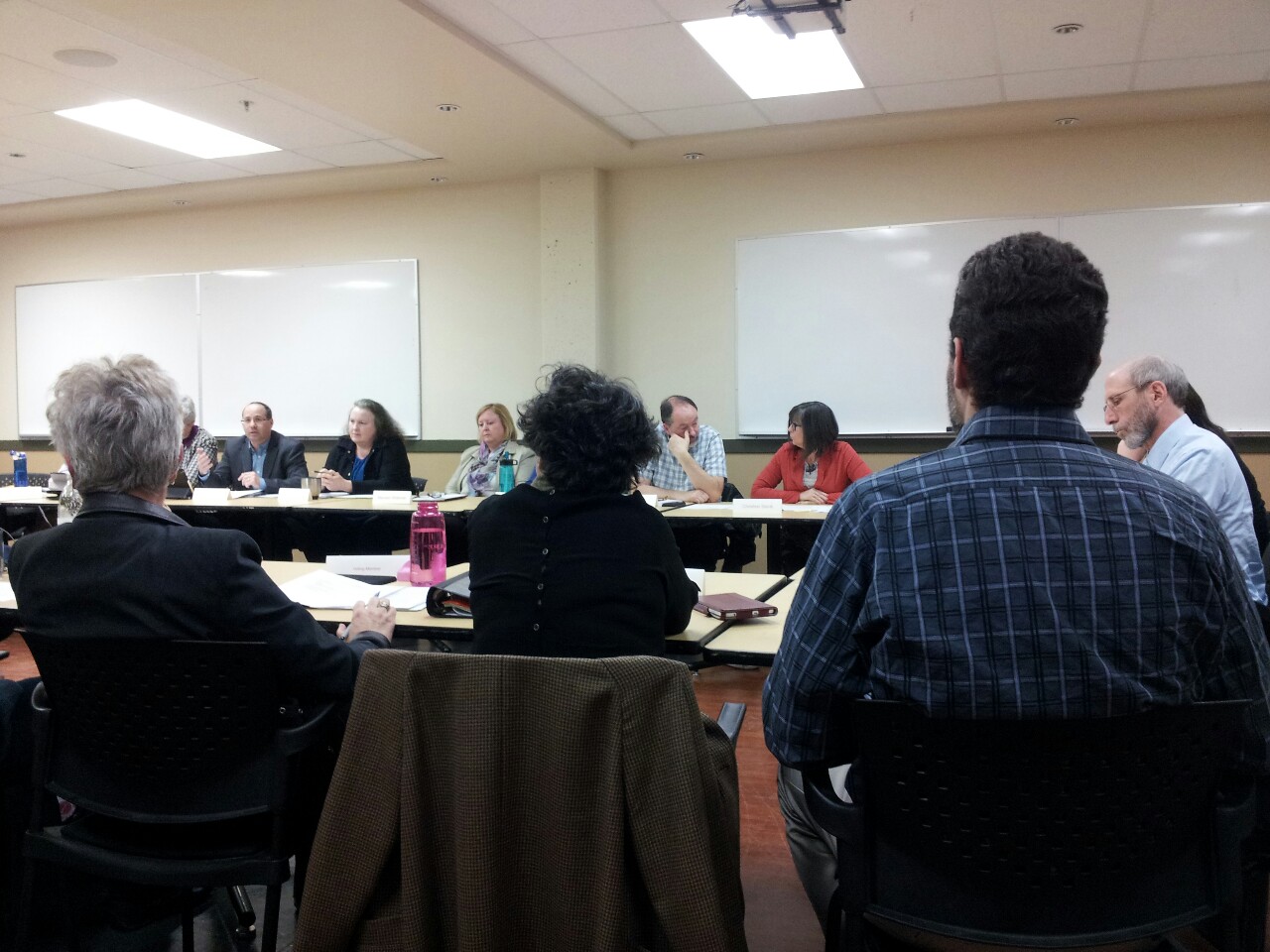By Michael Scoular (The Cascade/Photo) – Email
Print Edition: April 8, 2015

The Academic Planning and Priorities committee debated the decision-making and jurisdiction surrounding the Writing Centre two months after its closure was announced, and this delay weighed on much of the conversation.
“I’m just not totally sure where today’s motion goes or if it’s productive,” said Gerry Palmer in the meeting’s opening minutes. Nearly two hours later, after thorough, occasionally contentious points of argument, the APPC approved a motion that recommends the postponement of plans for the Writing Centre and a review of the full proposal. The APPC is a sub-committee of Senate, which in the university’s structure can advise the Board of Governors, a body that holds the final decision in many education matters, including, potentially, this one.
At the heart of the meeting’s unsettled questions was interpretation: secretary and registrar Al Wiseman’s agenda notes identified three vague phrases in the University Act, which outlines the network of processes within the university: “the development of educational policy,” “educational services,” and “resource centres.” How those words are interpreted, it became clear, both determined how the Writing Centre closure took place in February, and how it would be addressed in April.
“There are multiple points in this in which we can clearly see a link between the work at the Writing Centre, the proposed Academic Success Centre, and the jurisdiction of this committee,” said geography professor Michelle Rhodes. “All we have is the language before us, not intentions that are somewhere else. I think the evidence is overwhelmingly in favour of the fact that this is our jurisdiction.”
But Diane Griffiths, associate VP for human resources, summarized a different perspective, explaining how the Writing Centre decision was made without going through Senate. “People in administration did not see, within the APPC terms, those conditions that would bring the decision of the Writing Centre to the APPC … they would have seen this as a support service,” she said. “Faculty seem to be looking at this and saying, ‘We don’t see this as a support service, we see this as an academic or educational area.’ And I think that’s the grey area.”
Recent changes have also taken place within UFV’s educational advising services, as arts, sciences, and general advisors will be condensed into one location in the Student Union Building. As that is a “student service,” the decision was made at the administrative level. The distinction with the Writing Centre is that it was run by faculty members, who published academic work and educated, rather than facilitated help for students.
Griffiths also described the situation as difficult to disentangle now that it has been put into motion.
“Once that decision got taken, rightly or wrongly by administration, then the implementation of the decision went into confidentiality, because then you are talking about individuals,” she said.
By this point in the meeting, a number of topics were being expounded on simultaneously: the terms, the potential domino effect a recommendation to Senate could have, what a review of the proposal would mean exactly, and whether or not slowing down or changing the process would be possible. Maureen Wideman, who is overseeing the new project, provided a brief timeline, which would have the hiring process for peer tutors begin this month, as Writing Centre faculty are shifted to different departments.
Palmer, who is also Senate vice-chair, suggested that if the APPC did not receive direction on the matter, it might not be up to them to decide anything. “If Senate decides, after a discussion, to send the matter to the APPC, then it becomes a matter for the APPC,” he said.
This special meeting took place after discussion threatened to extend a previous meeting’s allotted time, but it also represented a larger-scale voicing of a matter that until then was discussed in offices, hallways, and online, with different members of the UFV community holding varying pieces of information. The average student may have seen a protest on the Abbotsford campus, heard about the news through friends, or read UFV’s official statement promoting the change — the theme of what this change means has yet to be settled for many.
History professor Scott Sheffield contextualized the choice before the committee as one with some urgency behind it. “Under the circumstances, my instinct would be to not pull back and leave a vacuum, but in fact to fill the vacuum,” he said. “I think to not act is to leave inertia and uncertainty on the floor.”
Christine Slavik, the committee vice-chair, expanded on Sheffield’s comment. “It’s ironic to me that we’re planning 2025, [when] we would look back at 2015 as the year we made this decision, that we chose to eliminate consultation and collegiality,” she said. “One of the things I teach in Child and Youth Care is ethical decision making. And one of the errors a lot of novice practitioners make is they hide behind policy when sometimes the right thing to do is to take risks and to do things in a different way and to learn.”
Eric Davis, VP academic and vice-provost, is the chair of the ACCP, and was in a unique position, as the decision that started this campus-wide conversation began at the administrative level, though Davis said it ultimately originated with Jody Gordon, the VP students. After chemistry professor Noham Weinberg observed a split between faculty and administration over the Writing Centre, calling it “a very bad sign,” Davis offered a comment echoing Griffiths’ earlier explanation.
“One of the [obligations] imposed on administrators is the obligation of confidentiality,” he said. “You can’t read into the superficial appearance of who’s speaking for or against something. You really can’t read too much into it, because you don’t know what you don’t know.”
The motion was called to a vote, with 13 in favour, four opposed.
The next level of debate for the Writing Centre, Senate, will take place this Friday, April 10 at their regularly scheduled meeting.

